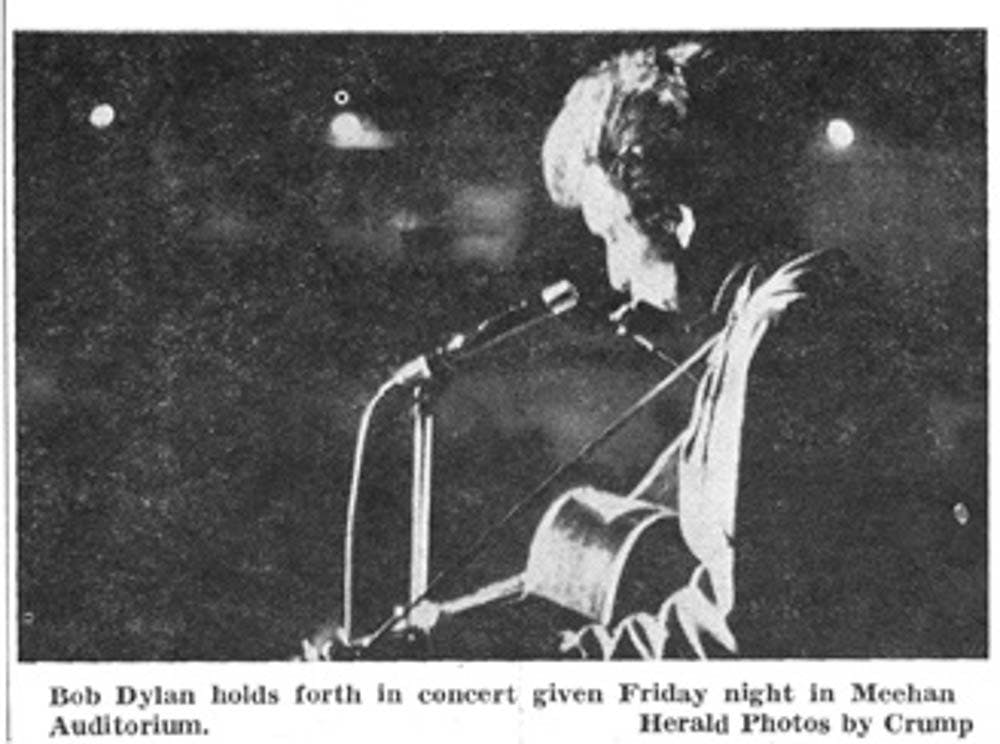What began as an inaugural spring “Junior Promenade” in 1898 has since become Brown students’ beloved music-packed and (on good years) sun-soaked Spring Weekend.
This year’s festivities mark the 67th anniversary of the event. Artists Young Thug, Princess Nokia, Empress Of and Cherry Glazerr are among the handful of performers who will join Spring Weekend’s star-studded legacy of artists that range “from Bob Dylan to Janis Joplin, U2 to R.E.M. to Elvis Costello to Bruce Springsteen to James Brown to, more recently, Kendrick Lamar, Snoop Dogg, Major Lazer, Vampire Weekend, M.I.A., MGMT, TV On the Radio, Lauryn Hill, The Roots, The Black Keys, Nas,” and The Flaming Lips, wrote Abby Schreiber ’11 in an email to The Herald. Schreiber served on the Brown Concert Agency, which organizes Spring Weekend, from 2007 to 2011 and acted as booking chair from 2010 to 2011.
Though Spring Weekend officially began in 1950, the first record of a spring celebration at Brown dates back to 1898, The Herald previously reported in 1897. The Junior Class Committee met to discuss the possibility of a Junior Promenade, but while the idea was shut down that year, it resurfaced and was approved in 1898, according to Encyclopedia Brunoniana. Junior Promenade became Junior Week in 1901, which was designed with a longer and more varied program than the singular Junior Prom. The 1901 ancestor of Spring Weekend featured performances by the Mandolin club, the Banjo club and the Glee Club, The Herald previously reported. Following these performances, students gathered for an informal dance backed by the orchestra, a ball game with Andover College, special chapel services and finally the Junior Promenade itself, which was held in Sayles Hall.
This tradition continued until World War II, when, in 1942, Chairman of the Junior Promenade Committee Steward T. MacNeill confirmed the prom “will be greatly modified from previous editions,” due to the ongoing war. In 1949, an All-Campus Weekend replaced the Junior Week and Promenade for one year. Mike Handman ’51, co-chair of the first Spring Weekend committee, confirmed in a 1950 Herald article “that two name musical organizations will be playing on The Hill on the same night.”
Spring Weekend had begun.
The Spring Weekend of the fifties does not bear much resemblance to that of today. Spring Weekend featured an “Interfraternity Sing Trophy” that was won by Alpha Delta Phi April 27, 1953, The Herald previously reported. The Jabberwocks held a concert, followed by an informal dance with music provided by jazz musician Claude Thornhill and his band. The next day featured an afternoon of crew races, and on Sunday students gathered for a jazz concert — Dave Binder wasn’t around quite yet.
“Spring Weekend began in 1950 but evolved into the weekend of concerts as we know it in 1960,” Schreiber wrote.
In the 1960s, concerts and shows replaced the formal and informal dances. The New Orleans Jazz Doctors mark the first band to play at Brown in the modern version of Spring Weekend. The Brown Concert Agency was founded in 1960 — the acronym BCA was widely known as the Brown Christian Association before Brown Concert Agency came along. “Spring Weekend has kind of gone in waves — as opposed to one continuous evolution — where there have been many years that featured smaller acts or local bands, and there are also cycles where the BCA has been able to bring bigger national acts,” Schreiber wrote.
In 1962, Ray Charles came to perform, followed by Ella Fitzgerald in 1965 and Tina Turner in 1972. Bruce Springsteen played at Brown April 16, 1974, The Herald previously reported. Tickets were sold for $10 each in an effort to make them affordable. “Tickets to all the shows will be within everyone’s budget,” said Brad Finley ’76, a BCA representative, at the time.
The 1985 edition of Spring Weekend came with a catchphrase and a theme, The Herald reported. That year’s “Bear on the Beach” kicked off with beach barbeque outside the tropical location of the Graduate Center Bar and ended with a midnight organ concert. The catchphrase “Take Life S/NC” was embraced in an effort to capture the spirit of the music festival, which showcased R.E.M. that year.
Until 1991, Spring Weekend also served alcohol. Dean Forsberg, director of student activities at the time, “speculated that the (Brown Concert Agency) had decided not to serve alcohol because of cost and potential liability problems.” Though not quite the same but still in the spirit of binging, booze was replaced with a pie-eating contest on the Main Green. The ’90s welcomed artists like A Tribe Called Quest and Joan Jett.
In 2009, BCA made the switch to electronic tickets. “Spring 2008 we were still selling paper tickets and students had to wait and camp out in Faunce and skip classes and totally disrupt their days and schedules for the chance to buy tickets,” Schreiber wrote. “Understandably this wasn’t an ideal system, and kids would get frustrated and upset because they’d waste a whole day and sometimes still not get a ticket.”
This 119-year-old tradition of spring gatherings is furthered by the BCA’s continued efforts to bring up-and-coming musicians to campus. As James Hinton ’10, who was on the board of the BCA in 2010 and helped book that year’s Spring Weekend, which featured MGMT, Major Lazer, the Black Keys and Snoop Dogg, said, “The idea is to try to get people who are on the come-up and not really trying to play the game that some of the bigger schools with much bigger budgets play, where they can get the most popular current set of artists that are blowing up the charts.”





